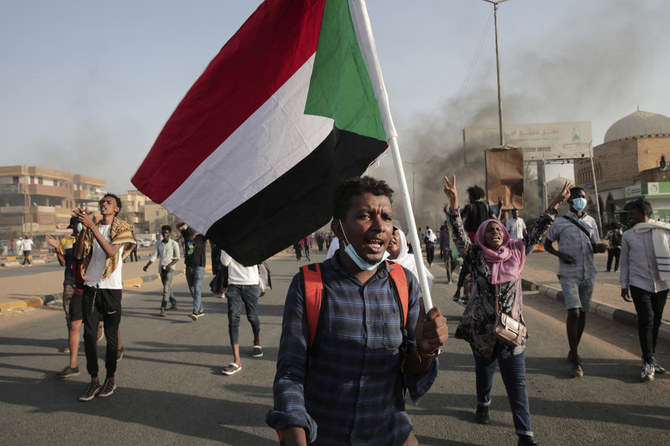CAIRO: Sudanese authorities released two outspoken former government officials from prison, lawyers said Wednesday, part of trust-building measures amid efforts to end the country’s political impasse.
Sudan was plunged into turmoil after an October military coup upended its short-lived transition to democracy after three decades of repressive rule by former strongman Omar Al-Bashir. Al-Bashir and his Islamist-backed government were removed in a popular uprising in April 2019.
Khalid Omar, a former minster of Cabinet affairs, was released late Tuesday and Mohammed Al-Faki Suliman, a former member of the ruling Sovereign Council, walked free from a prison in the capital of Khartoum on Wednesday, their defense team said.
The Criminal Court in northern Khartoum rejected prosecutors’ request to renew their detention pending investigations into an array of vague charges, including betrayal of the public trust, according to their lawyers.
Both Omar and Suliman had been detained along with dozens of other officials during the Oct. 25 coup and were released a month later as part of a deal between the military and Prime Minister Abdalla Hamdok. The premier resigned in January after failing to bridge the gap between the generals and the protest movement.
The two men were rearrested in February amid a crackdown by the generals on anti-coup groups. Dozens of activists were also detained amid relentless protests against the military’s takeover.
The crackdown on protesters killed more than 90 people, mostly young men, and injured thousands, according to a Sudanese medical group.
Suliman was also deputy head of a government-run agency tasked with dismantling the legacy of former autocratic President Omar Al-Bashir’s regime. The agency is known as The Committee to Dismantle the Regime of June 30, 1989, in reference to the Islamist-backed military coup that brought Al-Bashir to power. It was created after the uprising and for two years worked to purge Al-Bashir’s loyalists from government institutions.
The generals, including coup leader Gen. Abdel-Fattah Burhan, have long criticized the work of the agency. It was dismantled after the coup and the generals appointed another committee to review its decisions. Many of the agency’s decision were reversed, measures seen by critics of the military as a way to enable Islamists allied with the generals.
Other members of The Committee to Dismantle the Regime of June 30, 1989, including Wagdi Saleh, Taha Osman and Babiker Faisal were also released Wednesday, their defense team said.
Earlier this month, authorities freed over two dozen activists who were detained in recent weeks over the anti-coup protests.
The military’s takeover has plunged the country into turmoil and sent its already fragile economy into free fall, with living conditions rapidly deteriorating.
The UN envoy for Sudan, Volker Perthes, warned in March that Sudan was heading for “an economic and security collapse” unless it addresses the political paralysis. Perthes’ comments to the UN Security Council angered the generals and Burhan threatened to expel him.
Perthes is now leading joint efforts with the African Union and the eight-nation east African regional group called the Intergovernmental Authority in Development to facilitate Sudanese-led political talks. Perthes and the two organizations’ envoys held a joint news conference Wednesday in Khartoum on their efforts.
Ismael Wais, IGAD special envoy to Sudan, welcomed the releases as a “very positive development.” He urged authorities to free all political prisoners and activists and lift the state of emergency as a necessary condition to help facilitate reaching an agreement on a way out of the crisis.
Mohamed Al Hacen Ould Lebatt, the AU’s envoy for Sudan, said the group will launch a political dialogue after the Islamic holiday of Eid Al-Fitr, which marks the end of the holy month of Ramadan early in May.
He said the talks will include the military and other political parties and groups except Al-Bashir’s now dissolved Congress Party, with the aim of agreeing on how the country will be ruled during the rest of transitional period and holding elections.
“The situation in this country is highly sensitive if it is not extremely dangerous,” Lebatt said, adding that the talks eventually aim at “achieving the aspiration of the Sudanese people expressed in their revolution.”
There was no immediate comment from the two main protest groups, the Sudanese Professionals Association and the Resistance Committees, which have spearheaded the uprising against Al-Bashir and the ongoing anti-coup protests. They have long demanded the removal of the military from power and the establishment of a fully civilian government.
The generals, however, have said they will only hand over power to an elected administration. They say elections will take place in July 2023, as planned in a constitutional document governing the transit

